How to buy a house: The ultimate guide for first-time homebuyers
Buying a house for the first time is an exciting milestone! Whether you want to stop renting, relocate, or expand your family, we’re here to help you on your homebuying journey.
This step-by-step guide sheds light on the homebuying process and includes valuable tips and tricks to help you along the way. It’ll help you understand what a typical home purchase looks like from start to finish.
Remember that every homebuyer’s journey is different. Yours might be slower or faster depending on a wide range of factors.
Ready to get started? Let’s dive in.
Steps to buying a house
- Deciding if buying a home is right for you (6-12 months out)
- Determining your budget for a down payment (6-9 months out)
- Getting pre-qualified/pre-approved for a mortgage (3 months out)
- Finding your home (2-3 months out)
- Making an offer (2 months out)
- Preparing to close on your home (1 month out)
- Getting ready for closing day (1-2 weeks out)
- Final thoughts on how to buy a house
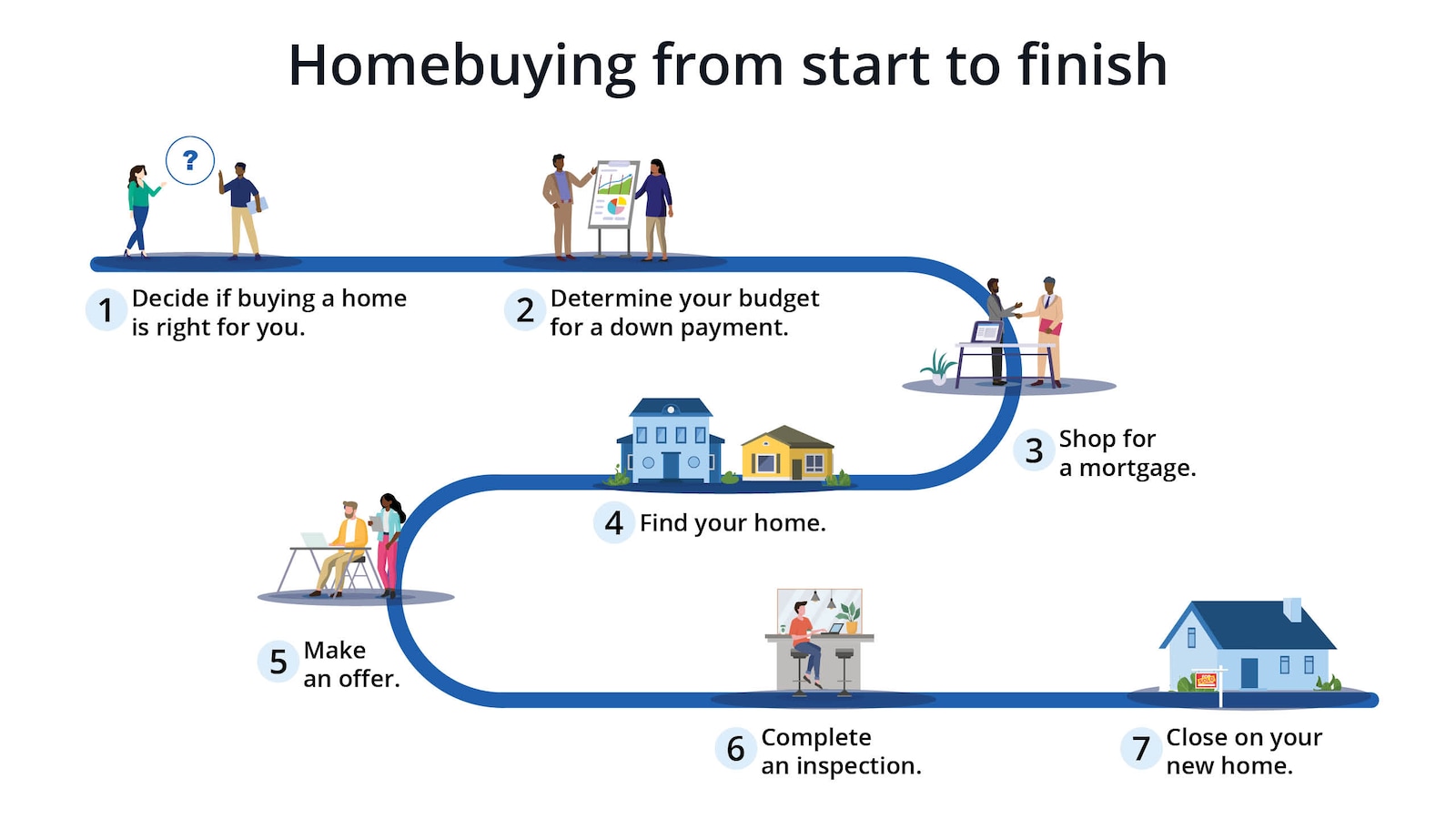
Factors such as your current financial situation, whether or not you have a hard deadline and the availability of homes can all play a role in determining how long it takes you to buy.
Whether you’re looking to buy quickly or have time to spare, it can be helpful to have a rough estimate of how much time each stage of the homebuying process tends to take.
1. Deciding whether homeownership is right for you (6-12 months out)
Consider your reasons for buying, then decide if it’s the right time to commit.
Before starting the homebuying journey, it’s good to pause and make sure that it’s the right decision for you.
Here are some factors you may want to think about before buying a home.
Identify your "why"
It's important to understand why you’d like to buy. Knowing what you’re looking for is the first step to finding the home of your dreams.
Homeownership is a solid foundation for your family. Owning a home builds equity over time, creating a store of wealth you can use in the future or pass on to future generations.
Should you rent or buy a home? Buying a home gives you more flexibility than renting, since you own it and can do what you want. It gives you the freedom to transform your living space into a place that feels truly yours.
If you’re already a homeowner, you may want to find a new place in a different location or one that fits your changing needs.
Knowing what you want out of a house will make it easier to decide where to live, what features you want and how much you’re willing to spend.
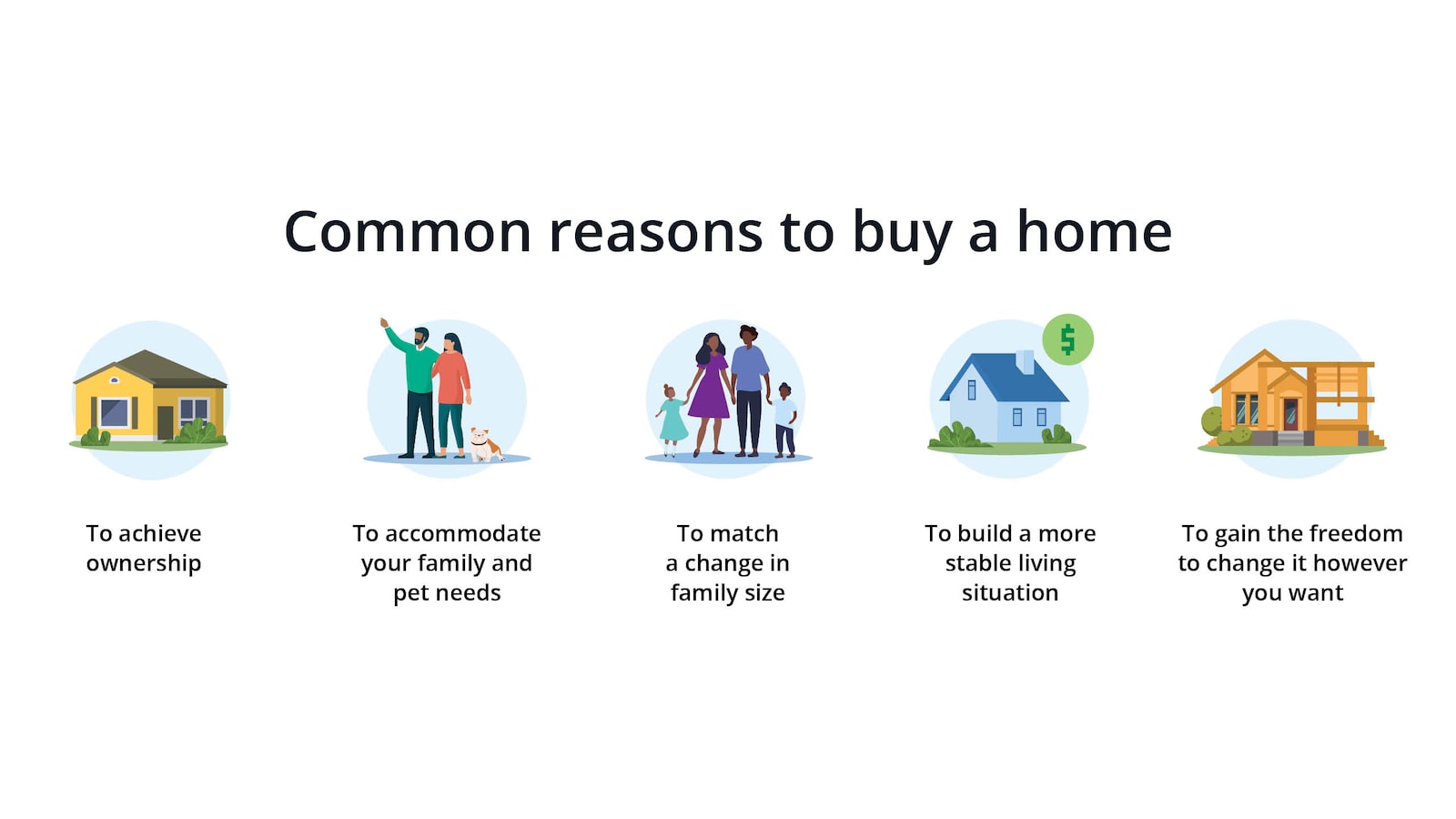
Consider market conditions
When you're buying a home, it can be helpful to understand what's going on in the real estate market. Conditions in the housing market can affect how long it takes you to find a home and the final price you pay.
Depending on the supply and demand of homes, the market may favor either buyers or sellers.
What's a buyer's market?
A buyer's market happens when there are more houses for sale than there are people looking to buy. Sellers may be willing to lower their asking price to make a sale, which benefits buyers.
You can browse online real estate listings to look for clues about what's happening in the market or talk to your real estate agent.
Signs of a buyer's market include:
- Homes stay on the market longer.
- Selling prices are below average.
- There's a recent history of price drops.
- More property listings available than usual.
What's a seller's market?
A seller's market means that there are more people looking for homes to buy than there are people putting houses up for sale. When that happens, buyers may face higher competition, leading to faster sales and fewer price drops.
Signs of a seller's market include:
- Homes sell faster.
- Selling prices are above average.
- Prices haven't dropped much recently.
- There are fewer property listings.
While knowing whether it's a buyer's or seller's market is valuable in your search, the right time to buy is dependent on your unique situation. Many people still buy in a seller's market and sell in a buyer's market.
Evaluate your credit score and finances
First, it's helpful to check your credit score and make sure your finances meet the requirements for buying a house.
Before you start searching for a house, it can help to save as much money as you can. This can help you get preapproved and put together a competitive offer. However, here's the good news:
You don't need to have enough money in the bank to buy a home outright.
In 2024, 74% of homebuyersOpens overlay financed their homes with mortgage loan. So, the question you want to ask yourself is, "Am I able to qualify for a home loan?" Start by checking your credit score.
Most conventional loans require a minimum credit score of 620, but a higher score can improve your chances of getting approved and securing lower interest rates.
If your score is lower than 620, you still have options.
There are a number of options for home loans with low credit. Steps like making payments on time and reducing debt can improve your credit score.
2. Determining your budget (6-9 months out)
Do your homework on your financial situation to determine what you can afford.
If you made it to the end of step one and decided that it’s the right time to buy a home, then the next step is setting a budget to help narrow your search.
Here are some of the most important factors to keep in mind when figuring out how much you can spend on your new home.
Set your housing budget
After you’ve checked your credit score to confirm you’re ready to apply for a loan, it's a good idea to figure out how much you want to spend on a monthly mortgage payment.
You can use online tools to help you figure out how factors like your down payment and interest rate affect your monthly payments. Chase's Home Affordability Calculatorhelps you find a recommended maximum home price based on your monthly income and loan terms.
Factor in other expenses
When you buy a car, it comes with ownership expenses like gas, insurance, and maintenance.
The same is true for homeownership. It’s a good idea to factor in the other costs of ownership on top of your mortgage. That helps you prepare for costs that come up during and after a home purchase.
The first cost to consider is mortgage closing fees and costs, which run from about 2% to 4% of the total price of the house on average. In other words, if you buy a house for $250,000, closing will typically cost between $5,000 and $12,500. Your specific costs will be influenced by the details of your purchase and finalized at closing.
After that, it can help to think about the total cost of ownership, which includes the expenses you take on once the house is yours. We’ll cover that next..
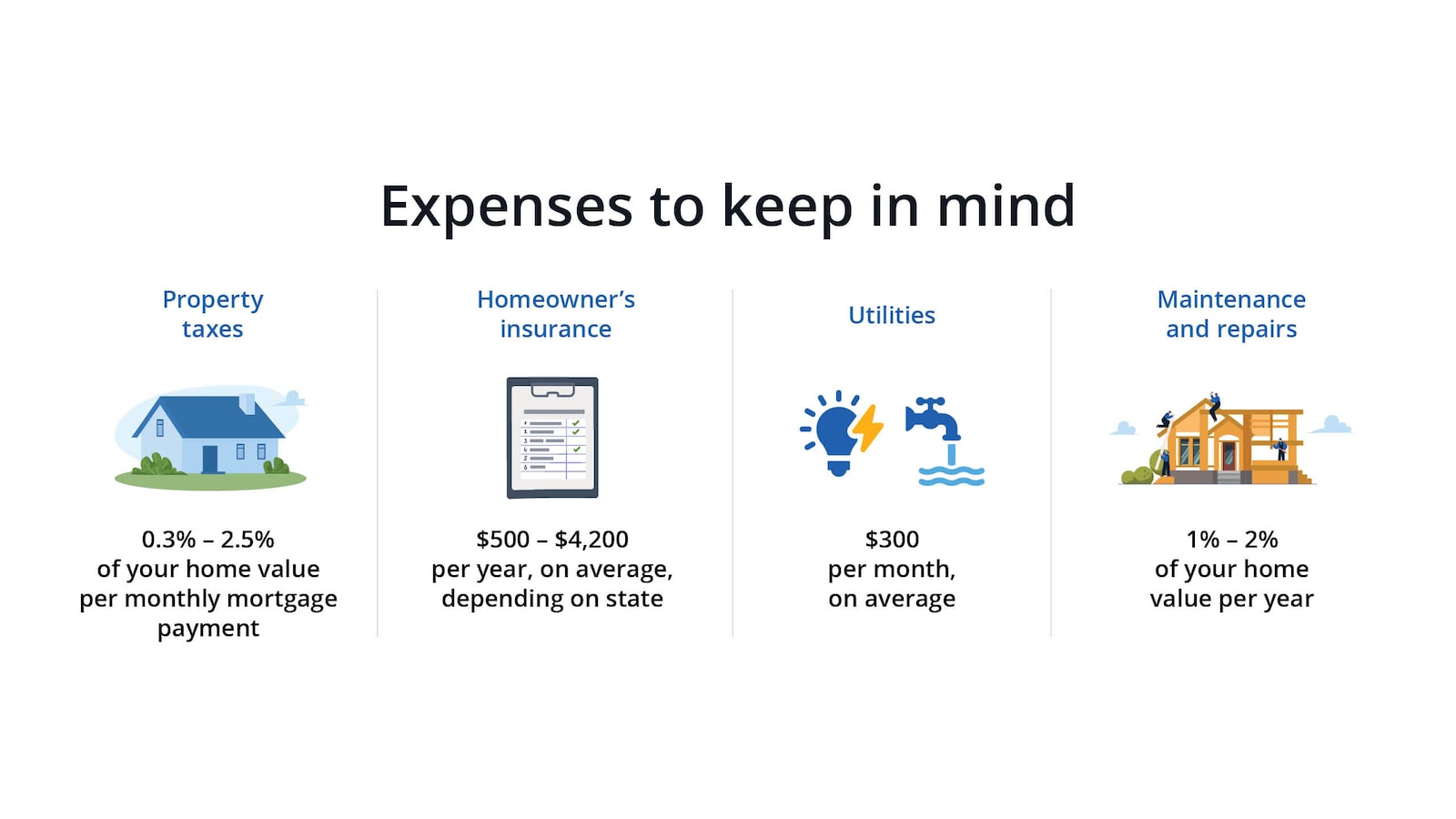
Here are some of the additional costs of owning a home:
- Property TaxesOpens overlay: These taxes range from 0.277% to 2.653% of your home's value, depending on your home's location..
- Homeowners insurance: NerdWallet reports that the average U.S. homeowners insurance cost is about $2,110 per year for $300,000 in dwelling coverage, with rates varying by state.
- Utility billsOpens overlay: U.S. utility costs average $500-$600 monthly ($6,000-$7,200 annually), covering electricity, gas, water, sewer, phone, internet, and TV services. Costs vary by location, home size, usage, and efficiency.
- Maintenance and repairs: Lenders recommend budgeting 1% to 2% of your total mortgage amount for your annual repair budget.
While those are general guidelines, it can be helpful to research the rates that apply to the neighborhood where you'll be living to get the most accurate estimates.
Put together your down payment
You may have heard that you'll need to put down a 20% down payment if you want to buy a house. According to the Mortgage ReportsOpens overlay, the down payment amount depends on factors like loan type and financial goals. You don't need the traditional 20% down.
Many first-time homebuyers are able to finance their homes using low down payment options. These make it possible to get loans with a minimum down payment as low as 3%.
That being said, if you can't put down 20% on a conventional loan, your mortgage lender will usually require Private Mortgage Insurance (PMI). PMI protects lenders in case of default, and typically costs you an extra 20% on a conventional loan each month. If you can make a down payment of 20%, PMI is not required.
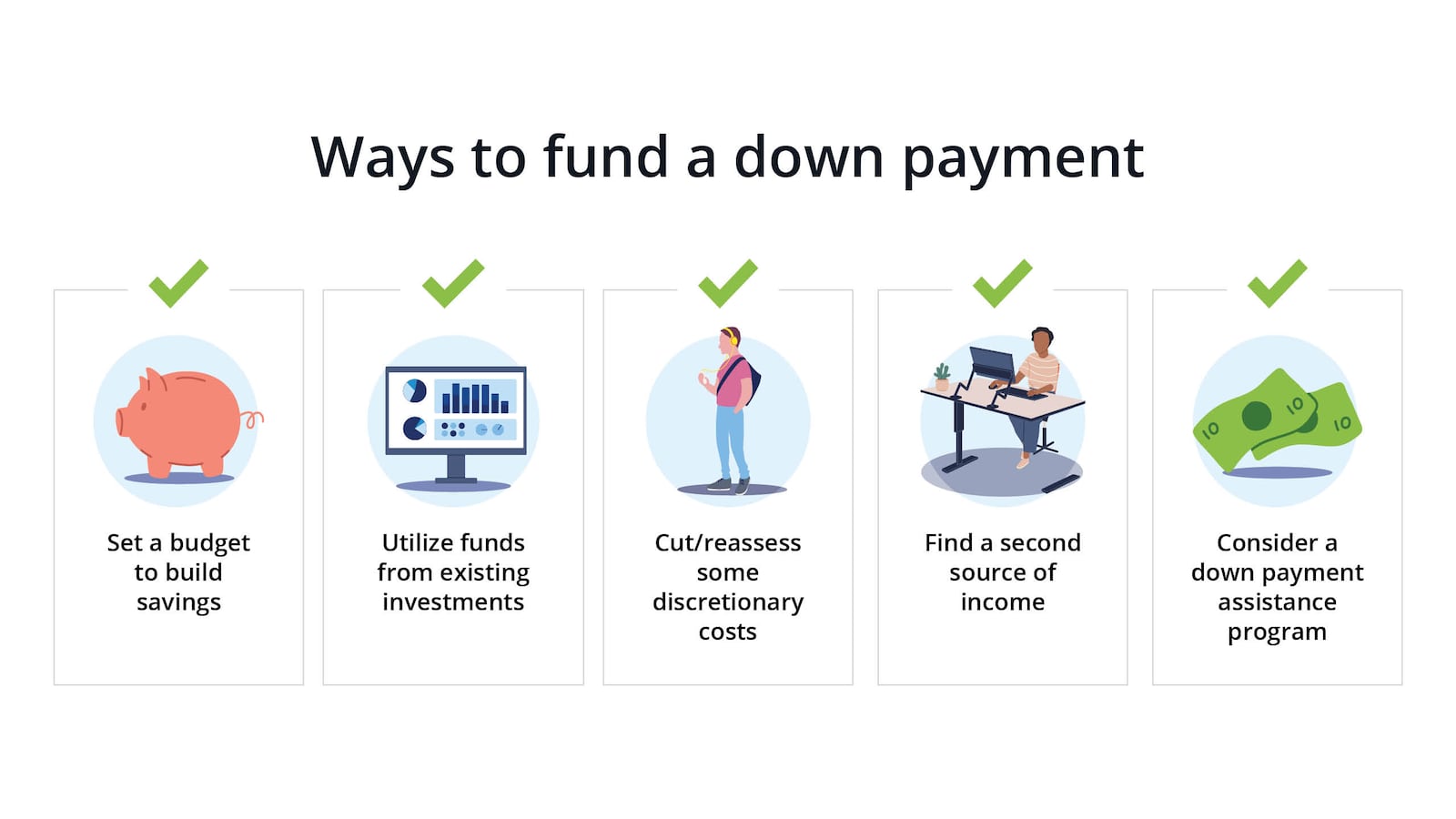
If you don’t have enough saved, you can find the money for your down payment by setting a budget to build savings, finding a second source of income or searching for down payment assistance programs.
At this stage, it’s also helpful to set aside money for closing costs. These are additional fees that you need to pay before you get the keys to your new house. We'll go into more detail on that in the closing step.
Closing costs vary depending on your state and lender, but it’s a good idea to budget 3% to 4% of your maximum home purchase price for those fees.
3. Getting a mortgage (3 months out)
Find out what mortgage is right for you and get a preapproval, which can help you when making an offer.
Before you get to the fun part of looking for your home, you’ll need to find a mortgage. With a trusted financial institution in your corner, when you’re ready to make an offer, you’ll have the information and leverage you need.
Get a preapproval
Learn how to get started on a preapproval for a mortgage and learn how much home you can afford.
Not to mention, having a mortgage preapproval is a major advantage for homebuyers. Getting preapproved shows sellers that you’re a serious buyer. In fact, some real estate agents won’t let buyers tour a house without it.
Take the first step of preapproval
When you apply for a preapproval, you can speed up the process by having your tax returns, proof of income and employer information from the last two years handy.
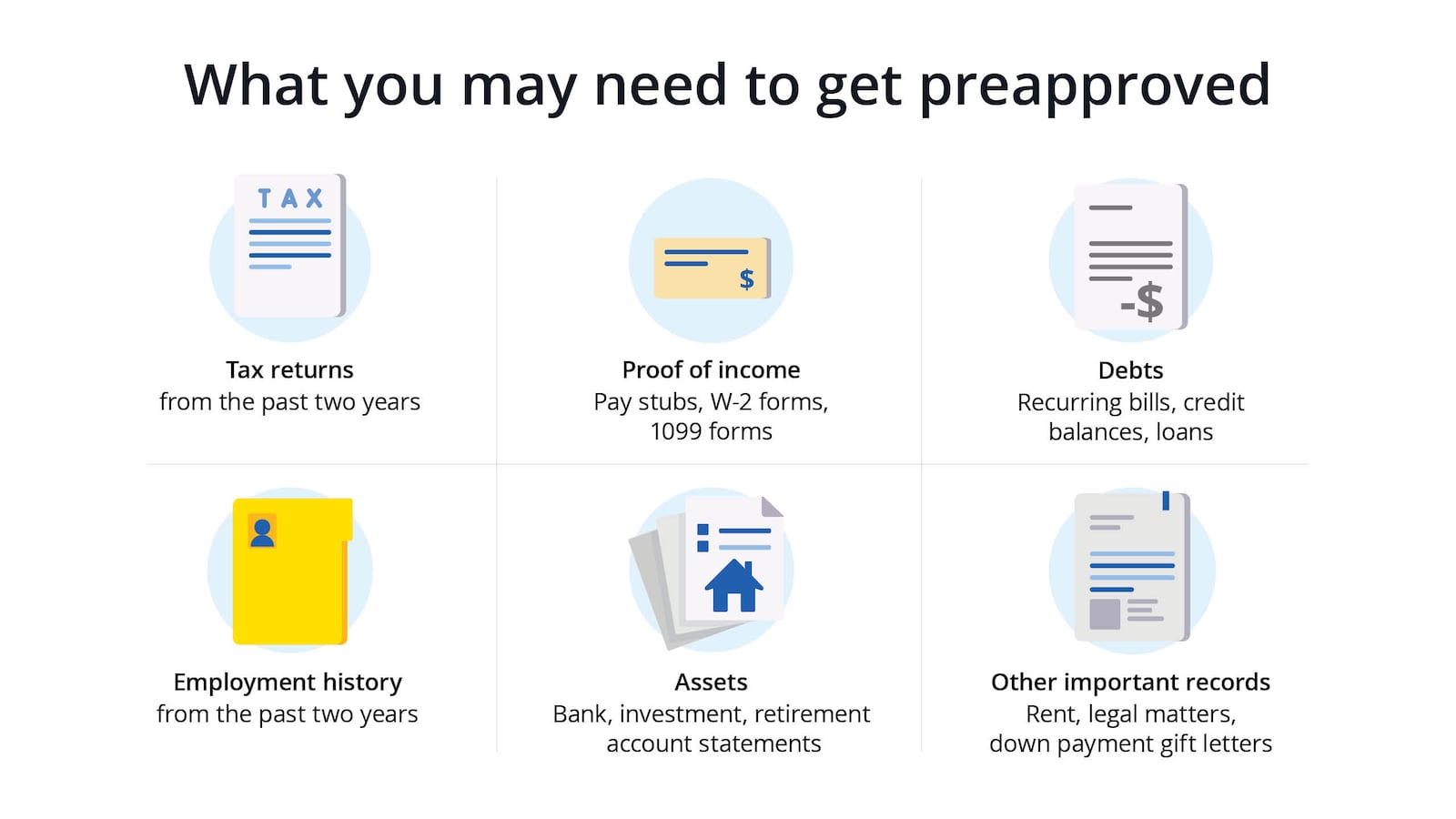
Once you're preapproved, it's important to avoid any major changes to your financial situation until you close on a home.
During the time you're shopping for homes and negotiating offers, try not to:
- Open new credit cards
- Take out new loans
- Make major purchases
Shop around
When choosing your mortgage, it's helpful to have options. Here are some of the common loan types to know about when starting your journey. Speaking with a home lending advisor can be especially helpful when deciding which of the many mortgage options is right for you.
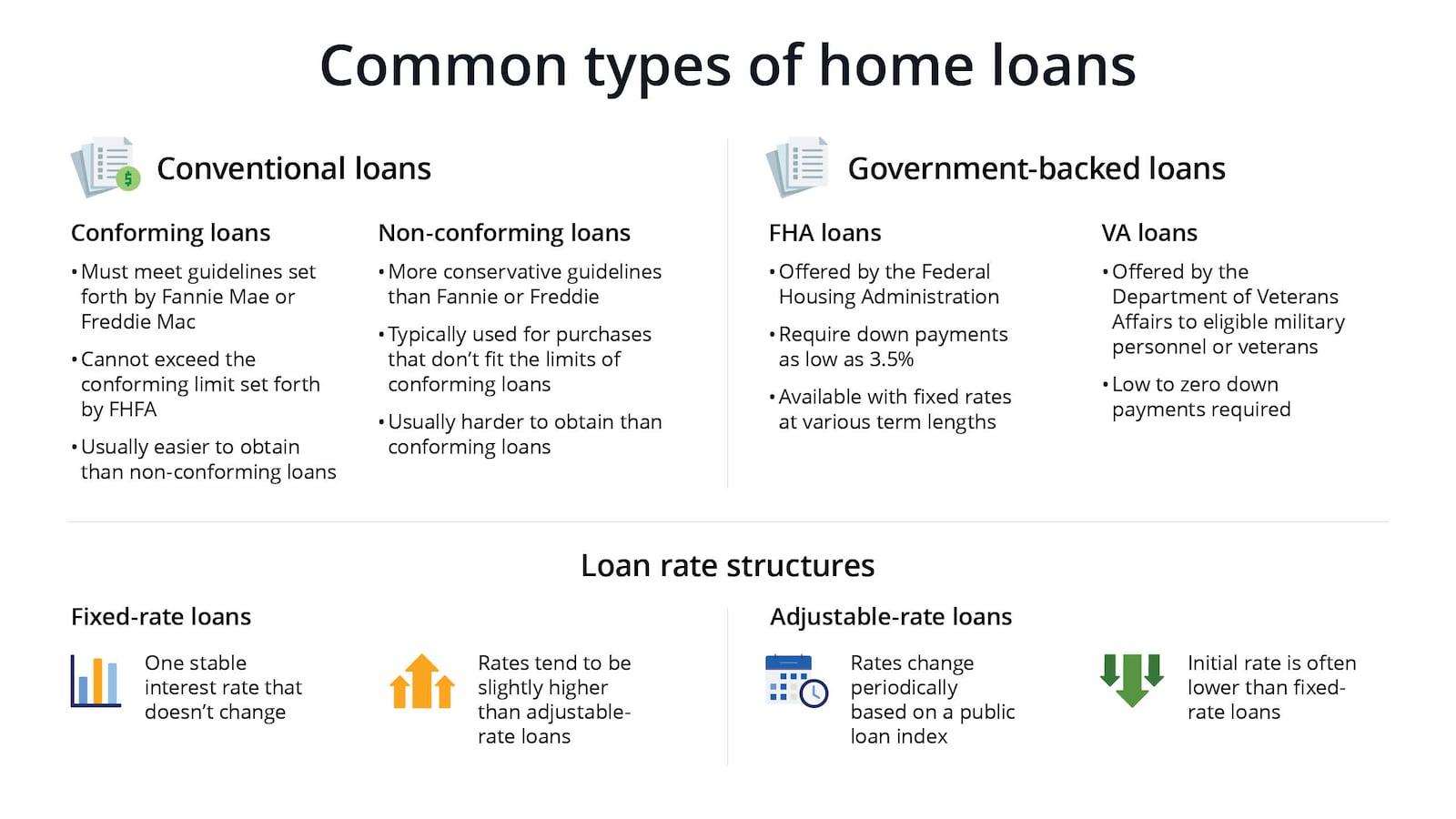
Conventional mortgages
Conventional loans are provided by private lenders like banks. They can be divided into two mortgage loan types: conforming and non-conforming.
Conforming loans meet certain government guidelines, and can't go above a limit set by the Federal Housing Finance Agency (FHFA).
Following these guidelines makes conforming loans eligible for purchase by Fannie Mae or Freddie Mac, so they're safer for lenders. As a result, they're also usually easier to obtain than non-conforming loans.
Non-conforming loans, or jumbo loans, don't follow the federal guidelines. They are usually used for home purchases that are more expensive than the conforming limits.
Government-backed loans
In addition to conventional mortgages, you can also get a government-backed loan. You can access these through private lenders, just like conventional loans. However, they are also insured by government programs like the Fair Housing Administration (FHA) and the Veterans Affairs (VA) department.
FHA loans are backed by the Federal Housing Administration and offer mortgages with as little as 3.5% down with various term lengths and fixed rates.
A VA loan on the other hand, provides low or no down payment options to qualifying military personnel and veterans.
You can use our Mortgage Calculator to compare your mortgage payments from different lenders.
Fixed vs. adjustable-rate mortgages
Some lenders offer adjustable-rate mortgages (ARMs), which use a fixed rate for a period of time and then continue to adjust (usually every six months) based on a reference index.
Your monthly payments can end up increasing or decreasing based on the index. ARMs are less predictable than fixed-rate mortgages, but they may offer some savings if your interest rates decrease.
If you're unsure which rate is right for you, speak with a financial or loan advisor who can help point you in the right direction.
Mortgage calculator with PMI, taxes & insurance
Asking about first-time homebuyer programs
Local governments, private foundations and local charities often have down payment assistance programs designed for first-time homebuyers.
Other types of assistance programs include government grants and first-time homebuyer loans with low (or no) interest. They may also come with the option to be released from paying the loan (loan forgiveness) or the option to put off payments for a period of time (deferred payment).
Use our Homebuyer Assistance Finder to see what incentive programs you may qualify for.
4. Finding your home (2-3 months out)
See multiple homes and narrow it down to one that you’d like to make an offer on.
With your finances in order, it's finally time for the fun part of buying a house: finding it!
Hire a real estate agent
It's easy to feel like you're lost in the homebuying process, especially the first time around. Working with a real estate agent with experience and know-how can make the process feel less overwhelming. A buyer's agent can also help you find a home in your price range and negotiate your offer.
Taking time to find a real estate agent makes the rest of the process smoother. If it's your first time buying, you may find it especially helpful to ask friends and family for a referral.
It can help to prepare a list of questions to ask an agent before you hire them. These questions can give you an idea what they're best at and what it'll be like to work with them:
- Have you already worked with clients who purchased homes in the neighborhood/area where I'm looking to move?
- How many homes do you usually show buyers before they make an offer?
- How often do you send your clients new listings?
- Do you see any trends in my chosen location that could affect home prices now or in the future?
Before working with an agent, it's good to verify their credentials, which you can do by searching for your agent on the Arello databaseOpens overlay.
Prioritize your preferences
As you start house hunting, it's helpful to think about the type of home you want and the features you'd like.
Here are some factors to consider:
- Number of bedrooms
- Number of bathrooms (half vs. full bathrooms)
- Number of floors
- Attached garage vs. detached garage
- Number of parking spaces
- Water source (water main or well)
- Waste disposal (sewer or septic)
- Finished basement, unfinished basement or no basement
- Pantry size
- Yard size
- Outdoor features (like a porch or patio)
- Location (distance to schools, public transportation, highways, etc.)
Once you have your list of wants, you can prioritize them by separating your checklist into must-haves and nice-to-haves. Be sure to think about how long you want to live in this home.
For example, if you plan to expand your family, you want to make sure you have enough room.
Start browsing
Once you've set a budget, gotten preapproved for a loan and found a buyer's agent, it's time to start browsing the market for your dream home.
When touring homes, you'll want to have your agent with you so they can learn more about your preferences. Your agent can also help with a wide variety of tasks at this stage like:
- Researching homes to find information like how long they've been on the market.
- Interacting and negotiating with sellers' agents.
- Guiding you on how to start the mortgage process.
- Answering any questions you might have about the process.
- Finding and scheduling showings.
- Telling you about anything else you might need to look out for.
It's helpful to prepare some questions to ask when viewing a house so you can get to know the property better.
You can also take advantage of new ways to tour homes like video chatting with a real estate agent. Some listings websites offer online 3D virtual tours that can help you decide which properties to see in person.
Whether you see a home online or in person, it's helpful to take notes during your tour. That way, you'll remember how you felt about each place when it's time to decide.
Our Chase MyHome dashboard lets Chase customers search home listings and get information on neighborhood trends and loan options all in one place.
Download Chase homebuyer's checklist (PDF)
5. Making an offer (2 months out)
Make an offer with the help of your real estate agent. If the seller agrees, be prepared to negotiate and put down some money to secure the offer.
Once you've chosen your ideal property, it's time to work with your agent to put together an offer. At the same time, you may also work with your lawyer to put together the contracts, financial documents, and title information that makes everything else possible.
Here's what putting together an offer looks like.
How much to offer
Selecting the right offer amount usually involves looking at market conditions, such as the sale price of other homes in the area.
Your buyer's agent can help you decide how much to offer based on your budget and the sale prices of similar homes. Your agent can also recommend contingencies, which are conditions that the seller has to meet before you buy (such as passing a home inspection).
A contingent offer can protect buyers. It ensures that if something goes wrong or the seller doesn't meet your terms, you can safely back out.
Provide a complete offer package
When you make an offer on a home, you don't just send over a number. Your agent will put together an entire offer package that includes information like:
- Your offer price.
- Your pre-approval letter.
- Proof that you have the money for a down payment.
- The offer's expiration date.
The offer will also suggest terms and contingencies, such as a list of closing costs and who's responsible for each.
Include earnest money in an offer
If you want to make your offer more competitive, your agent may recommend including earnest money. This is a good-faith deposit that you give the seller to show you're serious.
Your agent can help you decide how much to offer, but it's common to use 1% to 3% of the final purchase price. You'll usually send the earnest money to the seller within three days of an offer signing.
When you send earnest money, make sure to keep a copy of the check. You might need it to secure financing.
At this stage, your agent is the best source of advice. They'll help you make sure that your offer is complete and you're not missing any information.
Prepare for a counteroffer
Negotiations are common in the homebuying process, so be ready for the seller to make a counteroffer.
In addition to negotiating the selling price, they might want to change the terms or contingencies of your offer. For example, if you're selling your house and buying another, the seller might set a contingency saying that you have to sell your current house before closing on the new one.
If the seller sends a counteroffer, you have three options:
- Accept it.
- Reject it and move on to another property.
- Send another counteroffer.
Your agent can be one of your best resources here. They can take some of the stress out of negotiations by advising you and advocating for you throughout the homebuying process.
Accepting an offer isn't the same as closing. You can still back out after the seller has accepted your offer, but they might get to keep your earnest money if you change your mind. However, if something goes wrong or the seller doesn't meet a contingency, you can usually back out and get your earnest money back.
Having your offer accepted is a major step toward closing your new home. There's still more work to do, but you're well on your way to getting the keys.
Secure financing
When you're ready to buy, it's time to secure financing.
At this point, you'll give a copy of the signed purchase contract to a lender so they can move on to the next step of securing your mortgage. Having a preapproval will make this step faster.
Once a lender has your signed purchase contract and mortgage application, they can start the underwriting process.
What's mortgage underwriting?
Mortgage underwriting is how lenders go over loan applications. They use this process to determine if you're likely to pay back your loan, and will approve or deny it based on the results.
Here are just a few things an underwriter will consider:
- Your income and employment history
- Your financial assets
- Your existing debts
- Your credit history
- Your loan amount
- Your loan type
- How much your home appraises for
What's an appraisal?
Most lenders require that you get a home appraisal during the underwriting process. A home appraisal is a professional estimate of the property's market value performed by an unbiased third party.
Keep in mind that your home might appraise for a different value than the actual purchase price.
6. Preparing to close on your home (1-2 months out)
You'll need to get a few more things done before you close, including getting a home inspection and negotiating further contingencies.
Once a seller accepts your offer (or you accept a counteroffer), you have the chance to take a closer look at your future home and see if anything needs repairs. Negotiations and contingencies will determine whether you or the seller has to handle them.
Here's a primer on what happens during a home inspection and whether or not to negotiate repairs or credits.
Set a contingency period and get a home inspection
When you tour a property, you don't get to assess elements such as the foundation, insulation and other systems (like plumbing or heating). But if you're moving in, you'll need to know about unseen safety issues or necessary repairs..
That's why most buyers have a professional do a home inspection before moving on to closing. Your agent can usually connect you with recommended inspectors. As the buyer, it's your responsibility to arrange and pay for the inspection.
Your agent will provide guidance about when to schedule a home inspection. If you've made a contingent offer, you can also schedule it during a contingency period afterward.
A contingency period is a timeframe after signing the contract during which both the buyer and the seller can back out if certain requirements aren't met. Contingency periods aren't mandatory, but they're a helpful way to protect buyers and sellers if a contingent offer falls through.
A contingency clause in your contract lets you define your requirements. If the inspection reveals a problem, you typically have the option to back out. If you still want to buy the house anyway, your contingency clause can help you gain financial concessions from the seller.
It's helpful to arrange your inspection early in the contingency period so you have time to review the results and decide if you want to move forward.
If the inspection reveals any safety issues or necessary repairs, you can renegotiate the offer. You might request that the seller make the repairs before closing or ask for a lower price if you'd prefer to handle them yourself.
Once again, your agent will be one of your best resources here. They can help you interpret the results of an inspection and figure out the best way to move forward.
7. Getting ready for closing day (1-2 weeks out)
Do a final walkthrough and then close on the house.
After finishing the inspection and addressing any final changes to your offer, you've made it to the home stretch. It’s time to prepare for closing day!
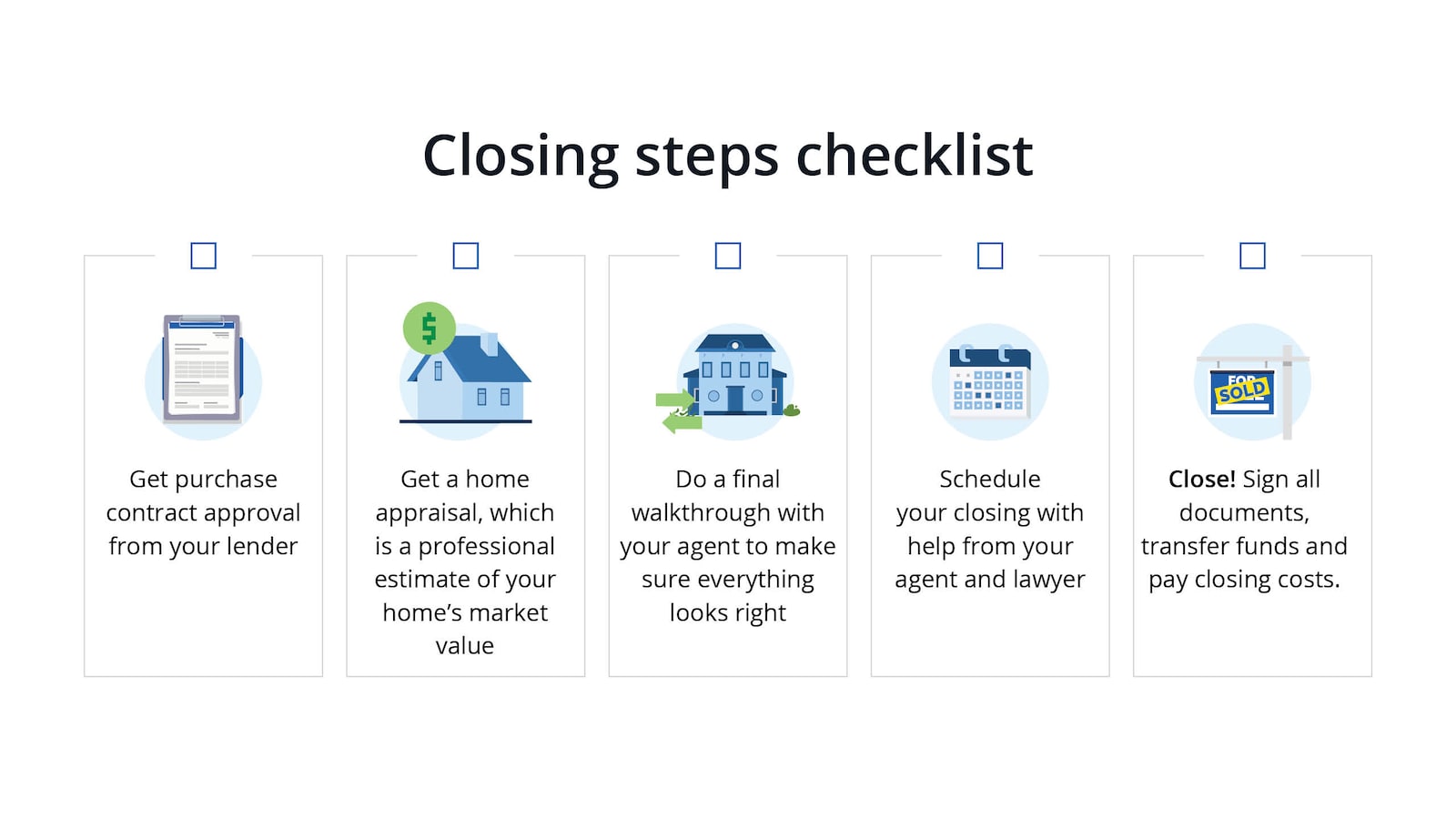
Here's what you'll need to do:
Final walkthrough
One or two days before you close on the house, you and your agent will do a final walkthrough of the home. You should bring your contract along so you can make sure that the seller has honored all contingencies.
Sign and close
Closing day is the final step on your journey to becoming a homeowner. It's the day when the ownership of the house officially gets transferred to you.
On closing day, you'll need to bring all the contracts and documents you've collected. You'll also need to bring a cashier's check or proof of wire transfer to cover closing costs.
What are closing costs?
Closing costs are the added expenses associated with securing a home loan and transferring ownership. Examples include:
- Attorney fees
- Appraisal fees
- Title fees (to verify there are no tax liens and to cover owner's title insurance)
- Loan origination fees
- Underwriting fees
Here's a quick video that covers closing costs in more detail and gives more insight into what you can expect to pay:
How Closing costs & fees figure into your buying journey.
What to expect on closing day
A lot of people will show up on closing day. Along with you and your agent, you’ll also need:
- The seller and seller’s agent.
- Your lawyer to help you understand the contracts. (Some states require lawyers for real estate closings)
- A representative from the title company, who transfers the home ownership documents from the seller to you.
- A closing agent who can answer your questions about the closing documents.
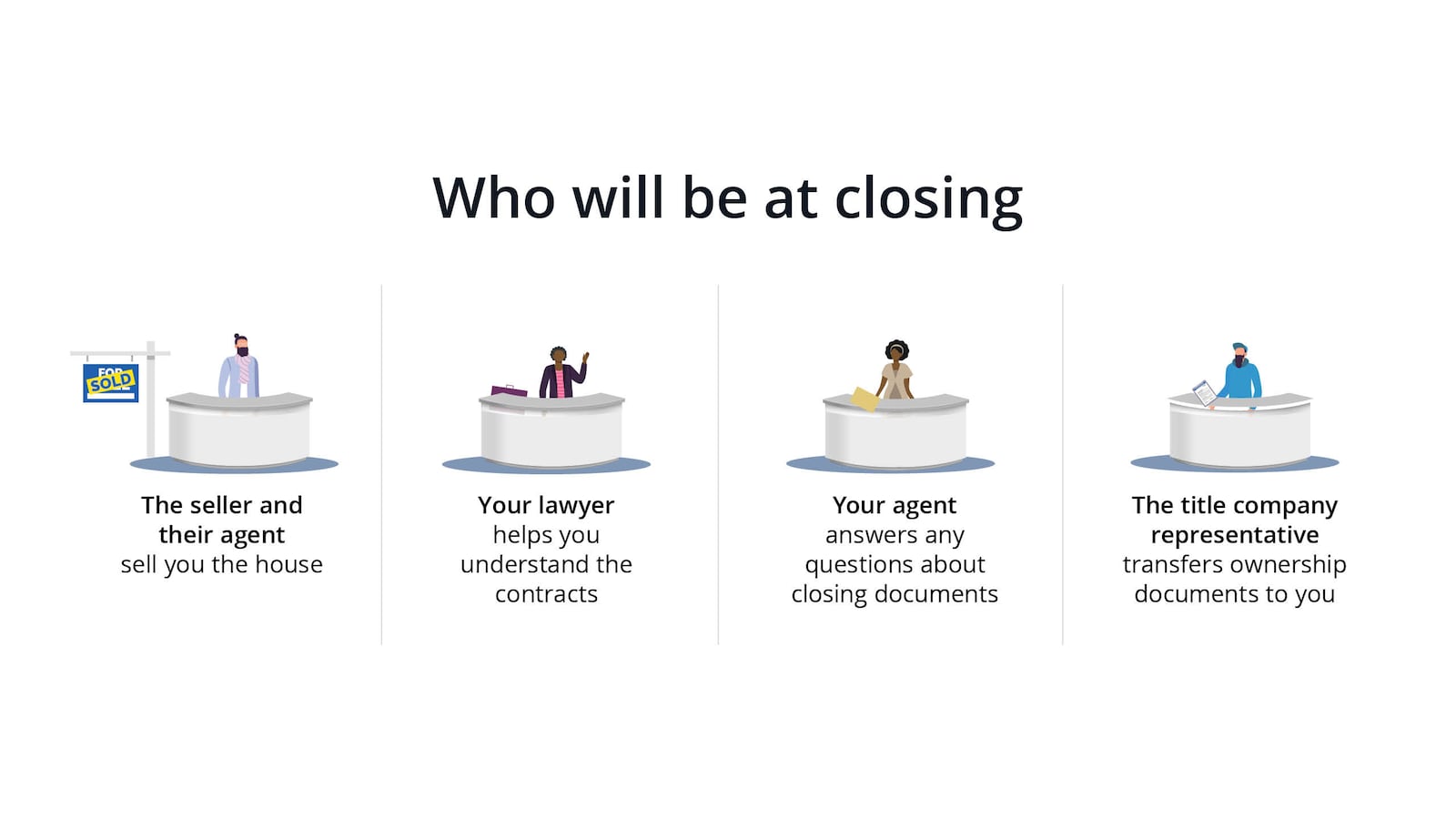
It can take a couple of hours to go over everything and sign the required documents. That being said, it's good to take your time.
You want to avoid signing anything that you don't understand. If you have questions, your real estate agent (and your lawyer, if present) are there to help you.
Once you've signed all the documents and the seller has transferred ownership of the house to you, it's officially yours! The seller will give you the keys to the house and you can start moving in.
Final thoughts on how to buy a house
Buying a home is an exciting step and may even mean fulfilling a long-time goal of yours. It may seem like a long journey, but with the right help, you can end up holding the keys to your dream home.
Chase is here to help you navigate the complicated mortgage process, from a preapproval to closing, using our extensive experience with first-time homebuyers and securing the financing they need. To get started, find a Home Lending Advisor near you.
If you want to get started online, our personal mortgage page has all the tools you need to find a home and explore your loan options.